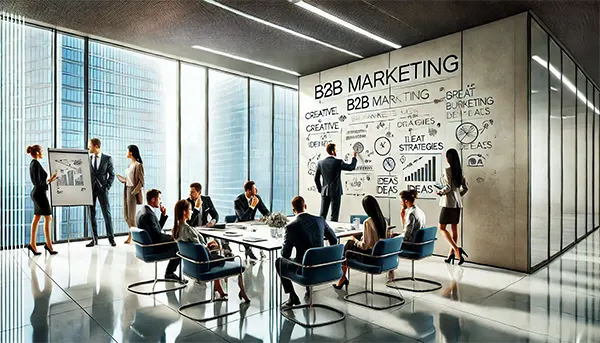
Trends in B2B Marketing: What to Expect in 2025
The B2B marketing landscape is evolving rapidly, and as we move into 2025, businesses must be prepared for the changes ahead. Technological advancements, the shift towards personalization, and a greater emphasis on data-driven decision-making are expected to be the key trends. For B2B marketers, staying ahead of these trends will be critical in achieving business growth and building strong customer relationships. This article will explore the major trends to expect in 2025 and how B2B companies can leverage them to remain competitive and relevant in the marketplace.
1. The Rise of Artificial Intelligence and Automation
As we move closer to 2025, AI and automation are expected to continue their dominance in the B2B marketing space. Businesses will be increasingly leveraging AI to streamline various marketing functions, such as lead generation, customer segmentation, and content personalization. These technologies will allow companies to deliver highly targeted campaigns and measure their effectiveness in real-time, making marketing efforts more efficient and impactful.
Automation will also play a crucial role in simplifying and optimizing workflows for B2B marketers. Automated tools will help businesses to deliver personalized content at scale, allowing them to engage with clients more effectively. By automating tasks such as email marketing, social media posting, and reporting, businesses will be able to allocate more resources toward high-value activities such as strategy development and client relationships.
In 2025, the integration of AI and automation will also allow B2B marketers to predict customer behavior more accurately. Using predictive analytics, businesses will be able to make data-driven decisions that enhance their targeting efforts. AI will assist in understanding customer needs and behaviors, ensuring that marketing messages are delivered at the right time, to the right audience, with a level of precision that was previously not possible.
Leveraging AI to Personalize Customer Experiences
The key benefit of integrating AI in B2B marketing is the ability to personalize customer interactions. As AI technology advances, businesses will be able to craft individualized marketing strategies based on real-time data and customer insights. Personalization will no longer be a one-size-fits-all approach; instead, each customer interaction will be tailored to the specific needs and preferences of the client.
AI tools will also help businesses create dynamic content that adapts to customer behavior. For example, AI-powered email marketing campaigns will send tailored messages based on how customers have interacted with previous emails. Similarly, AI algorithms will recommend products or services to customers based on their browsing history or previous interactions with the brand.
With AI, businesses will be able to continuously refine their marketing strategies to ensure they are meeting customer expectations. These tools will enable marketers to gather insights into customer preferences, improving the quality and relevance of their campaigns. As AI continues to evolve, personalization will become more precise and seamless, creating an even stronger connection between businesses and their customers.
2. Personalization at Scale
Personalization in marketing is not a new trend, but its significance will continue to rise in 2025. As customers become more discerning and expect tailored experiences, businesses must find ways to deliver personalized content, offers, and communications at scale. This shift towards personalization will require the use of advanced data analytics and AI to effectively target and engage customers at each stage of their journey.
The ability to deliver personalized experiences at scale will allow B2B businesses to differentiate themselves from their competitors. Customers will be more likely to engage with brands that understand their needs and preferences, leading to higher conversion rates and stronger brand loyalty. However, achieving personalization at scale will require businesses to invest in the right tools and technologies to collect and analyze customer data.
Additionally, businesses will need to focus on maintaining a consistent and seamless experience across all touchpoints. Whether it’s through personalized emails, targeted social media ads, or customized product recommendations, B2B companies will need to ensure that their messaging aligns with the customer’s interests and needs. Personalization will also need to extend to customer service, where businesses will provide tailored support based on individual customer histories and preferences.
How Data Analytics Will Drive Personalization
Data analytics will be at the core of B2B personalization efforts in 2025. With more data available than ever before, businesses will use advanced analytics tools to better understand customer preferences, behaviors, and pain points. This data will be used to segment customers into specific groups, allowing businesses to deliver highly relevant content and offers to each group.
By analyzing customer data, B2B companies will be able to predict what customers want, often before they even realize it themselves. For example, predictive analytics will enable businesses to anticipate customer needs based on historical behavior, helping marketers craft personalized campaigns that are more likely to lead to conversions.
Furthermore, businesses will be able to fine-tune their personalization strategies based on real-time data. Using tools like dynamic content and real-time analytics, businesses can continuously optimize their marketing efforts and ensure they are meeting customer expectations. This real-time personalization will allow B2B marketers to stay ahead of trends and deliver content that truly resonates with their audience.
3. The Shift Towards Account-Based Marketing (ABM)
Account-based marketing (ABM) is rapidly gaining popularity in the B2B marketing space, and by 2025, it will become even more important. ABM involves targeting specific, high-value accounts with personalized marketing campaigns, rather than casting a wide net across a broader audience. This approach allows businesses to focus their resources on the accounts that are most likely to convert, resulting in more efficient marketing efforts.
The success of ABM lies in its ability to foster deeper relationships with key decision-makers within target accounts. By tailoring marketing efforts to address the specific pain points and needs of individual accounts, businesses can build stronger connections with their clients. ABM also allows for a more coordinated approach between marketing and sales teams, as both teams work together to target and nurture high-value accounts.
As B2B marketers embrace ABM in 2025, they will increasingly rely on advanced technologies and data analytics to identify and engage target accounts. By integrating CRM systems with ABM tools, businesses will be able to gain deeper insights into account behaviors and preferences, making it easier to create highly targeted campaigns. With the right tools and strategies in place, ABM will help B2B companies maximize their marketing ROI and increase conversion rates.
Integrating ABM with AI and Data Analytics
In 2025, the integration of ABM with AI and data analytics will be a game-changer for B2B marketers. AI tools will help businesses identify the most valuable accounts by analyzing historical data and predicting which accounts are most likely to convert. Additionally, AI will help businesses deliver more personalized campaigns by providing insights into account behaviors and preferences.
Data analytics will play a crucial role in refining ABM strategies. By analyzing data from multiple sources, businesses will gain a comprehensive view of each target account, allowing them to create more relevant and engaging content. This data-driven approach will help businesses focus their marketing efforts on the accounts that matter most, leading to higher conversion rates and greater customer satisfaction.
By integrating AI and data analytics into their ABM strategies, B2B marketers will be able to create highly personalized campaigns that resonate with target accounts. This will not only improve customer engagement but also drive long-term business growth and success in a highly competitive marketplace.

Conclusion
The trends in B2B marketing for 2025 are centered around technology, personalization, and targeted strategies. Businesses that embrace AI, automation, and data-driven marketing will be well-positioned to meet the evolving needs of their clients. As the landscape continues to change, staying ahead of these trends will be key to driving growth, improving customer relationships, and maintaining a competitive edge in the B2B sector.
In the future, B2B marketers must remain agile, adapting quickly to emerging trends and technologies. The key to success will be maintaining a customer-first mindset while leveraging the latest tools and techniques to drive meaningful engagement and results. Those that can effectively harness the power of AI, personalization, and ABM will be the ones who lead the charge in 2025 and beyond.
Similar news
-
 Clone Landing Pages and Domain Spoofing: How Br...
Clone Landing Pages and Domain Spoofing: How Br...Clone landing pages and lookalike domains remain one of the …
-
 “Negative PR as a service”: what commercial sme...
“Negative PR as a service”: what commercial sme...The phrase “negative PR as a service” is used for …
-
 How Fake Review Networks Operate in 2026: Real ...
How Fake Review Networks Operate in 2026: Real ...Fake review networks have moved far beyond “a few paid …
